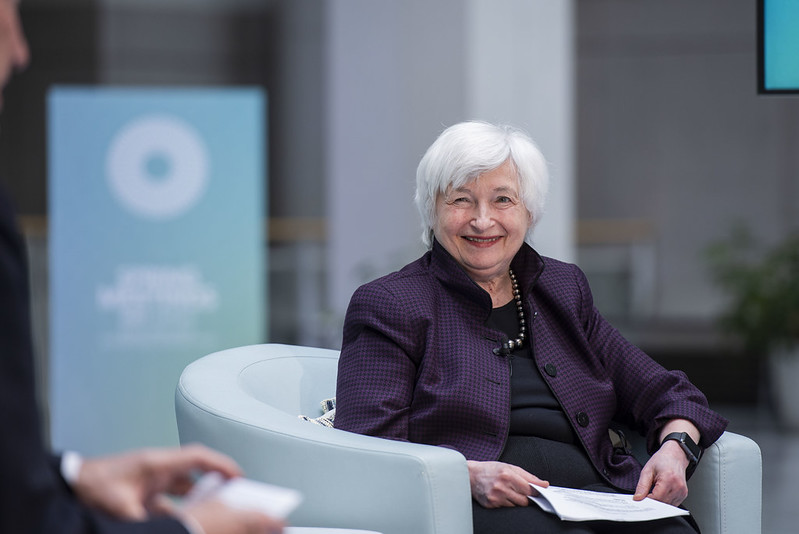One critic of the agreement said that “by settling for anything less than a 25% tax rate, the G7 is telling their citizens and the world that they’re willing to keep the race to the bottom alive and kicking.”
By Jake Johnson, staff writer for Common Dreams. Published 6-5-2021

U.S. Treasury Secretary Janet Yellen at the World Bank 2021 Spring Meetings. Phpto: World Bank/flickr/CC
Representatives from seven of the world’s wealthiest nations reached an agreement on Saturday to support a global minimum tax rate of at least 15% for multinational companies, a move aimed at curbing the use of tax havens and ending the decades-long race to the bottom on corporate taxation.
The deal struck by the U.S., Japan, Germany, France, the U.K., Italy, and Canada still faces a long road to implementation, but Saturday’s development marks substantial progress toward a global accord that could allow governments to raise revenue from corporate giants notorious for shifting operations and profits overseas to avoid taxes.
“The G7 has taken significant steps this weekend to end the existing harmful dynamic, making commitments today that provide tremendous momentum towards achieving a robust global minimum tax at a rate of at least 15%,” U.S. Treasury Secretary Janet Yellen said Saturday. “This effort is far from over, and we look forward to engaging closely with the G20 and members of the OECD Inclusive Framework process in the coming weeks to finalize an agreement on the global minimum corporate tax as soon as possible.”
While arguing that the proposed 15% global minimum tax rate is too low, economist Gabriel Zucman hailed the G7 agreement as “a game-changer because it slashes incentives for multinational firms to book profits in tax havens, thus removing incentives for tax havens to offer low tax rates.”
“In effect, this severely undermines (and ultimately destroys) the development model of tax havens,” Zucman, a professor at the University of California, Berkeley whose work has focused on tax avoidance and the use of tax havens.
Zucman explained that a 15% global minimum tax “does not mean that all countries must increase their corporate tax rate to 15%.”
“It means that multinational profits will be subject to a 15% minimum effective rate,” he continued. “Take a German multinational that books income in Ireland, taxed at an effective rate of 5%. Germany will now collect an extra 10% tax to arrive at a rate of 15%—same for profits booked by German multinationals in Bermuda, Singapore, etc. Other nations will proceed similarly.”
According to the E.U. Tax Observatory, an independent research organization, a 15% global minimum tax on multinational corporations would allow the U.K. to bring in €200 million in additional revenue per year just from BP—which, like other major oil giants, works to avoid its tax obligations in its home country by shifting profits to overseas tax havens.
Olaf Scholz, the German finance minister, said Saturday that the G7 agreement—which must ultimately be approved by the U.S. Congress and the legislatures of other nations—is “very good news for tax justice and solidarity and bad news for tax havens throughout the world.”
Tax justice campaigners, though, were highly critical of the deal, warning that its benefits would largely flow to G7 nations while leaving much of the world behind.
“The G7 has decided to finally move the international tax system into the 21st century, but only enough to shamelessly benefit just themselves,” Alex Cobham, chief executive at the Tax Justice Network, said in a statement. “The G7 finance ministers are proposing to follow OECD proposals that would ensure the G7 themselves take the lion’s share of any new tax revenues—which will in any case be limited by their lack of ambition.”
Cobham has argued that the OECD framework—which the G7 leaders praised in their communiqué—privileges countries that serve as headquarters to multinationals over countries that serve as hosts for corporate operations, meaning that rich nations will likely reap most of the benefits of an eventual minimum tax agreement.
“By settling for anything less than a 25% tax rate, the G7 is telling their citizens and the world that they’re willing to keep the race to the bottom alive and kicking,” said Cobham. “Rarely does the opportunity to better the lives of billions of people in a single stroke come by, but when history came knocking today, the leaders of the richest countries in the world turned their back on it.”
“Even the G7 and OECD recognize that the international tax rules are unfit for purpose,” Cobham continued. “The disproportionate power exercised by these rich countries’ clubs today shows that the way international tax rules are determined, too, is unfit for purpose. It is now well past time for international tax rules to be set democratically at the U.N., starting with a U.N. tax convention.”
As the Washington Post reported Saturday, the Biden administration “initially floated a 21% global minimum tax but that rate was eventually lowered to 15%.”
“The lower rate will make it easier for countries to join the accord but may reduce its effectiveness,” the Post noted. “If the U.S. [corporate tax] rate is raised to 28% but the global minimum tax is 15%, firms may still have strong incentives to move their operations overseas.”
Zucman and other experts have emphasized that the proposed 15% global minimum tax is a floor and that governments can, and should, go higher.
“Let’s be clear: nothing prevents us [from moving] quickly to 25%, Zucman said Saturday. “No need for a global agreement: the U.S. can tax its multinationals at 25%, France can do the same, etc. Tax havens cannot block a high minimum tax—because other countries can always choose to collect the taxes that tax havens choose not to collect.”

